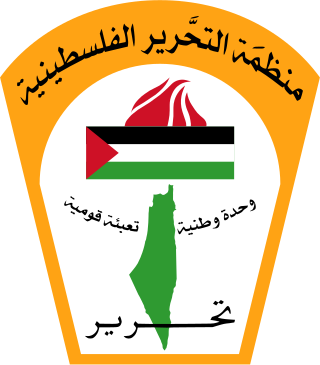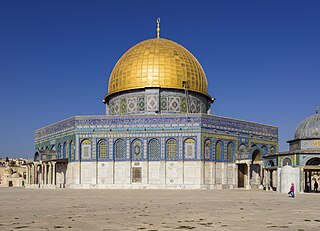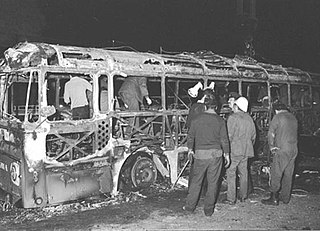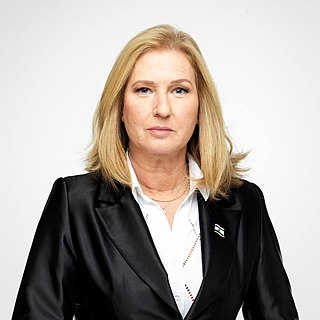
The Palestine Liberation Organization is a Palestinian nationalist coalition that is internationally recognized as the official representative of the Palestinian people in both the Palestinian territories and the diaspora. It is currently represented by the Palestinian Authority based in the West Bank city of Al-Bireh.

Yitzhak Rabin was an Israeli politician, statesman and general. He was the fifth prime minister of Israel, serving two terms in office, 1974–1977, and from 1992 until his assassination in 1995.

The Israeli–Palestinian conflict is an ongoing military and political conflict about land and self-determination within the territory of the former Mandatory Palestine. Key aspects of the conflict include the Israeli occupation of the West Bank and Gaza Strip, the status of Jerusalem, Israeli settlements, borders, security, water rights, the permit regime, Palestinian freedom of movement, and the Palestinian right of return.

The history of the State of Palestine describes the creation and evolution of the State of Palestine in the West Bank and Gaza Strip. During the British mandate period, numerous plans of partition of Palestine were proposed but without the agreement of all parties. In 1947, the United Nations Partition Plan for Palestine was voted for. The leaders of the Jewish Agency for Palestine accepted parts of the plan, while Arab leaders refused it. This triggered the 1947–1949 Palestine war and led, in 1948, to the establishment of the state of Israel on a part of Mandate Palestine as the Mandate came to an end.

The First Intifada, also known as the First Palestinian Intifada, was a sustained series of non-violent protests, acts of civil disobedience and riots carried out by Palestinians in the Israeli-occupied Palestinian territories and Israel. It was motivated by collective Palestinian frustration over Israel's military occupation of the West Bank and the Gaza Strip as it approached a twenty-year mark, having begun in the wake of the 1967 Arab–Israeli War. The uprising lasted from December 1987 until the Madrid Conference of 1991, though some date its conclusion to 1993, the year the Oslo Accords were signed.

The Geneva Initiative, also known as the Geneva Accord, is a draft Permanent Status Agreement to end the Israeli–Palestinian conflict, based on previous official negotiations, international resolutions, the Quartet Roadmap, the Clinton Parameters, and the Arab Peace Initiative. The document was finished on 12 October 2003.

Saeb Muhammad Salih Erekat was a Palestinian politician and diplomat who was the secretary general of the executive committee of the PLO from 2015 until his death in 2020. He served as chief of the PLO Steering and Monitoring Committee until 12 February 2011. He participated in early negotiations with Israel and remained chief negotiator from 1995 until May 2003, when he resigned in protest from the Palestinian government. He reconciled with the party and was reappointed to the post in September 2003.
Intermittent discussions are held by various parties and proposals put forward in an attempt to resolve the Israeli–Palestinian conflict through a peace process. Since the 1970s, there has been a parallel effort made to find terms upon which peace can be agreed to in both this conflict and the wider Arab–Israeli conflict. Notably, the Camp David Accords between Egypt and Israel included discussions on plans for "Palestinian autonomy", but did not include any Palestinian representatives. The autonomy plan would later not be implemented, but its stipulations would to a large extent be represented in the Oslo Accords.

The coastal road massacre occurred on 11 March 1978, when Palestinian militants hijacked a bus on the Coastal Highway of Israel and murdered its occupants; 38 Israeli civilians, including 13 children, were killed as a result of the attack while 76 more were wounded. The attack was planned by the influential Palestinian militant leader Khalil al-Wazir and carried out by Fatah, a Palestinian nationalist party co-founded by al-Wazir and Yasser Arafat in 1959. The initial plan of the militants was to seize a luxury hotel in the Israeli city of Tel Aviv and take tourists and foreign ambassadors hostage to exchange them for Palestinian prisoners in Israeli custody.

The Palestinian Democratic Union, generally known as FIDA is a small Palestinian political party active in the Palestine Liberation Organization (PLO) and the Palestinian National Authority (PNA).

Tziporah Malka "Tzipi" Livni is an Israeli politician, diplomat, and lawyer. A former member of the Knesset and leader in the center-left political camp, Livni is a former foreign minister, vice prime minister, minister of justice, and leader of the opposition. She is known by some for her efforts to resolve the Israeli–Palestinian conflict.

Huwaida Arraf is a Palestinian American activist and lawyer who co-founded the International Solidarity Movement (ISM), a Palestinian-led organization using non-violent protests and international pressure to support Palestinians.

The Arab–Israeli conflict is the phenomenon involving political tension, military conflicts, and other disputes between various Arab countries and Israel, which escalated during the 20th century. The roots of the Arab–Israeli conflict have been attributed to the support by Arab League member countries for the Palestinians, a fellow League member, in the ongoing Israeli–Palestinian conflict; this in turn has been attributed to the simultaneous rise of Zionism and Arab nationalism towards the end of the 19th century, though the two national movements had not clashed until the 1920s.
The future of Palestinian prisoners detained by Israel in the context of the Israeli–Palestinian conflict is considered central to progress in the Israeli–Palestinian peace process. Cases of prison sentences include the charges of terrorism or being a member of an "illegal terrorist organization", such as Hamas or prior to the Oslo Accords the Palestine Liberation Organization, but according to some accounts also by political activism such as raising a Palestinian flag.

Denmark–Palestine relations refers to the contacts between Denmark and the Palestinian Liberation Organization. Denmark has a representative office in Ramallah. The State of Palestine has a semi diplomatic Mission with the rank of ambassador in Copenhagen. Denmark remains the only country in Scandinavia that has not recognized Palestine's existence and rights to sovereignty.

Direct negotiations between Israel and the Palestinian National Authority took place throughout 2010 as part of the peace process, between United States President Barack Obama, Israeli Prime Minister Benjamin Netanyahu, and Palestinian Authority Chairman Mahmoud Abbas. The ultimate aim of the direct negotiations is reaching an official "final status settlement" to the Israeli–Palestinian conflict by implementing a two-state solution, with Israel remaining a Jewish state, and the establishment of a state for the Palestinian people.

Political relations between the State of Palestine and the United States have been complex and strained since the 1960s. While the U.S. does not recognize the State of Palestine, it recognizes the Palestine Liberation Organization (PLO) as the legitimate representative entity for the Palestinian people; following the Oslo Accords, it recognized the Palestinian National Authority as the legitimate Palestinian government of the Palestinian territories.

The Oslo Accords are a pair of interim agreements between Israel and the Palestine Liberation Organization (PLO): the Oslo I Accord, signed in Washington, D.C., in 1993; and the Oslo II Accord, signed in Taba, Egypt, in 1995. They marked the start of the Oslo process, a peace process aimed at achieving a peace treaty based on Resolution 242 and Resolution 338 of the United Nations Security Council. The Oslo process began after secret negotiations in Oslo, Norway, resulting in both the recognition of Israel by the PLO and the recognition by Israel of the PLO as the representative of the Palestinian people and as a partner in bilateral negotiations.

Mustafa Barghouti is a Palestinian physician, activist, and politician who serves as General Secretary of the Palestinian National Initiative (PNI), also known as al-Mubadara. He has been a member of the Palestinian Legislative Council since 2006 and is also a member of the Palestine Liberation Organization (PLO) Central Council. In 2007, Barghouti was Minister of Information in the Palestinian unity government. He is an advocate of the use of non-violence and civil disobedience to confront Israel's illegal occupation of the West Bank, Gaza Strip, and East Jerusalem.

Afro-Palestinians are Palestinians of Black African heritage. In the Gaza Strip, around 1% of the population is estimated to be black, with roughly 11,000 Afro-Palestinians residing in Gaza City's Al Jalla’a district prior to October 2023. In Jerusalem, an estimated population between 200-450 reside in a historic African enclave around Bab al-Majlis, in the Muslim Quarter, as well as communities in other areas of Jerusalem such as Beit Hanina and A-Tur.


















